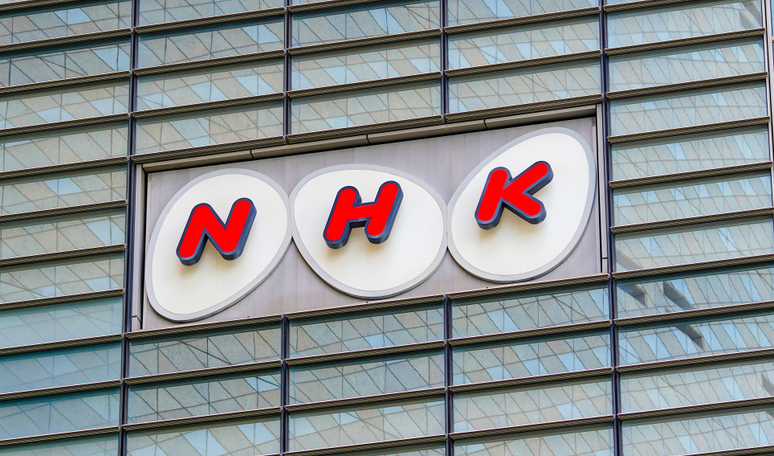You’ve made the move to Japan and are now settling into your new abode when, suddenly, the doorbell rings. You open the door and find a man who claims to be from an organization called “NHK.” He says you have to sign a lifelong contract right there and then to pay them a fixed amount every month! But why? This article covers everything you need to know about the NHK, including why the man is asking you to pay them and what your rights are. If you’ve already signed up with them, we even talk about how to cancel your NHK contract or reduce your monthly payments!
What Is the NHK?

“NHK” refers to Japan’s only public national broadcaster, known as the Nihon Hoso Kyokai (日本放送協会) or in English, the Japanese Broadcasting Corporation. They operate many channels and cover news, emergency reporting, concerts such as the end-of-the-year special NHK Kohaku Uta Gassen (NHK Red and White Song Battle), etc.
NHK Official Website: https://www.nhk.or.jp/ (Japanese Only)
Why Is the NHK Asking You to Pay Them?
As a public broadcasting company, NHK is funded through television license fees. In order to make sure that the NHK gets adequate funding to perform its duties as Japan’s national broadcaster, the Broadcasting Act (link takes you to the latest version of the act, Japanese only) includes clauses stating that anyone with equipment able to receive NHK broadcasts must pay this fee. As most people in Japan have such equipment, it is standard practice for them to ask every new resident to pay up.
How Much Are NHK Fees?
There are three levels of fees depending on your equipment’s ability to receive broadcasts:
- Basic Broadcast Fee (地上契約): Able to receive terrestrial TV broadcasts.
- Satellite Broadcast Fee (衛星契約): Able to receive both terrestrial and satellite TV broadcasts.
- Special Broadcast Fee (特別契約): Due to factors out of your control such as the land you’re on, you can only receive satellite TV broadcasts.
To determine which level you should pay, someone from NHK needs to check both the building you live in as well as any equipment you have that can accept their broadcasts.
The fee table is as follows:
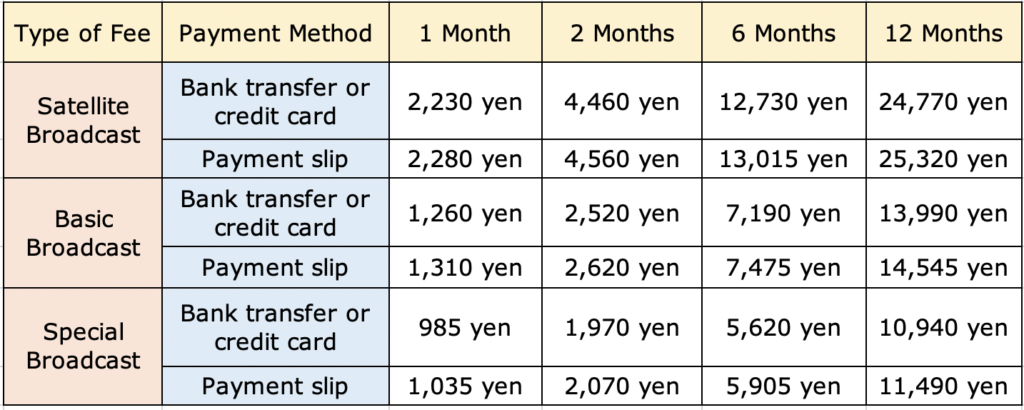
Please note that starting from October 2020, they will lower their fees across the table. This is a regular occurrence that happens whenever the NHK reports greater profits than their forecasts expected, and shows its position as an organization that works for the people.
The new fee table will be as follows:

** There is currently no info regarding fee changes for Special Broadcast fees.
The above fee tables apply for every part of Japan, with the exception of Okinawa. Please see the below fee tables if you’ll be moving to Okinawa.

* All figures include tax.
** There is currently no info regarding Special Broadcast fees.
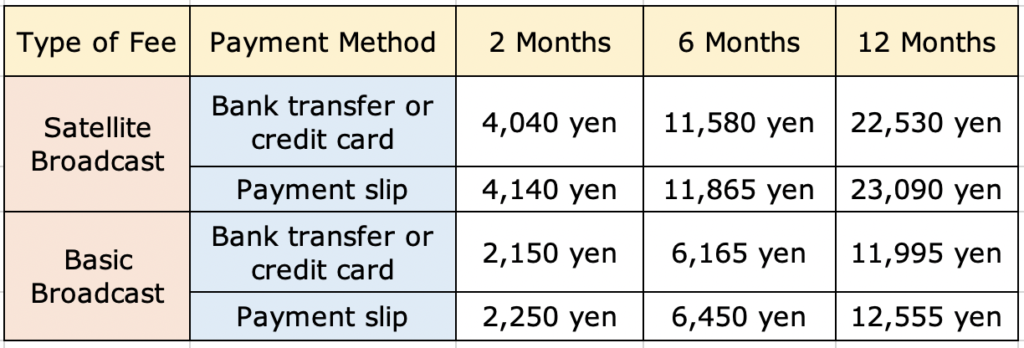
* All figures include tax.
** There is currently no info regarding Special Broadcast fees.
Can the NHK Force You to Pay Them?
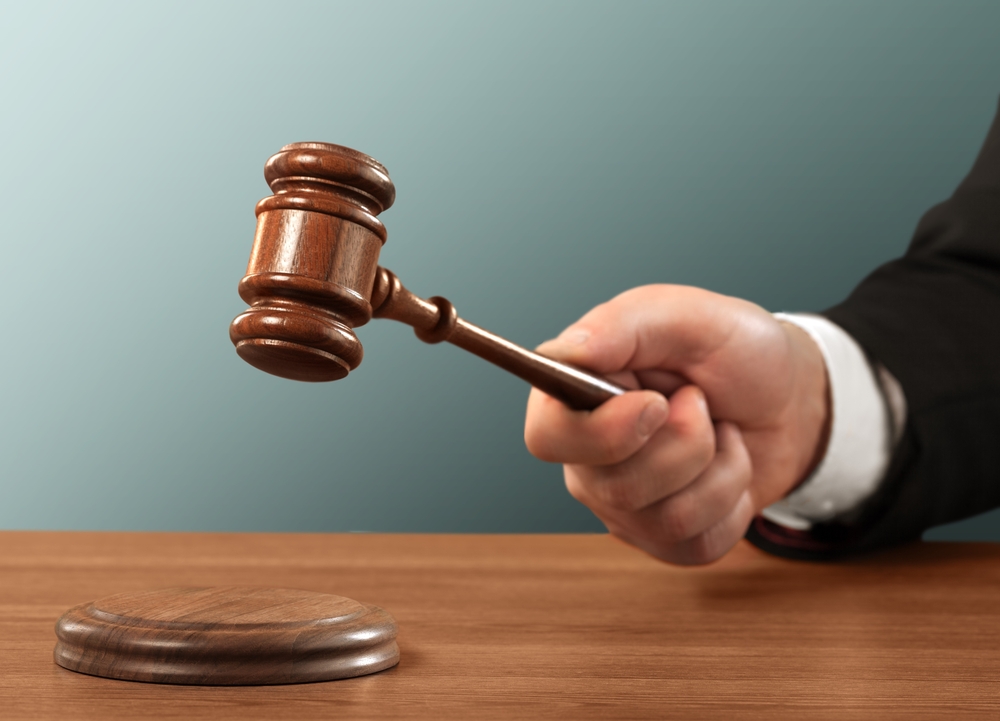
The Broadcasting Act states only those who have signed a contract with the NHK need to pay the monthly fee, and even then, failure to pay will not incur any penalties. Due to this, many people will argue that no, you are not required to pay the NHK and they cannot force you to do so.
However, this argument is false and based on incomplete information.
If you look at NHK’s website (Japanese only), you’ll find that if you’ve already signed a contract with them and fail to pay, they can take you to court to settle the payment. In fact, they have already done this several times in the past, with the court ruling in their favor the majority of the time. Similarly, if you refuse to sign a contract with them and they have proof that you possess devices or equipment able to receive their broadcast signals, they can take you to court to legally force you to sign it.
What falls under the umbrella of “broadcast-receiving equipment” has, in recent years, been a popular question among the Japanese. The introduction of services such as NHK Plus, where you can watch NHK channels on your smartphone and computer, as well as “1seg”—a mobile broadcasting service that you can use with certain mobile phones, car navigation systems, and even electronic dictionaries—has led to NHK workers claiming that even just owning a smartphone or computer means that you are legally obligated to pay up.
These claims are, however, incorrect. While you do have to pay if you own any “1seg” equipment, no ruling (as of the time of writing this article) states that just owning a smartphone or computer is enough to make you legally obligated. This was further confirmed by an NHK representative in 2019 (Japanese only).
By the way, there aren’t many phones that actually have 1seg capability. If you bought your phone overseas, chances are high that it doesn’t support 1seg. If you really want to make sure your phone doesn’t have 1seg capability, ask a mobile phone store to check for you. Many stores will also clearly state if their phones support 1seg or not.
Why Don’t People Want to Pay the NHK?

The NHK provides a public service that many people use, so why are some people against paying the NHK?
The ultimate reason is because it robs people of their freedom. Under the Broadcasting Act, residents are legally obliged to sign the contract and pay the NHK. Even if they stop owning a TV or don’t watch NHK at all, their obligation to pay will not end. Failure to pay up has, in the past, resulted in the NHK filing a claim against them in court or gotten them harassment in the form of NHK door-to-door contractors repeatedly visiting their abode until they do comply. This has greatly angered many residents over the years.
Another reason is because of the contract length. Unlike many other contracts you’ll sign in your lifetime, the one with NHK binds you for life. Those against this argue that since the contract length is so long and there are very few situations where they can actually cancel the contract (which we’ll explain in more detail later), people should be given the right to decide if they want to sign it.
Can I Cancel My NHK Contract?
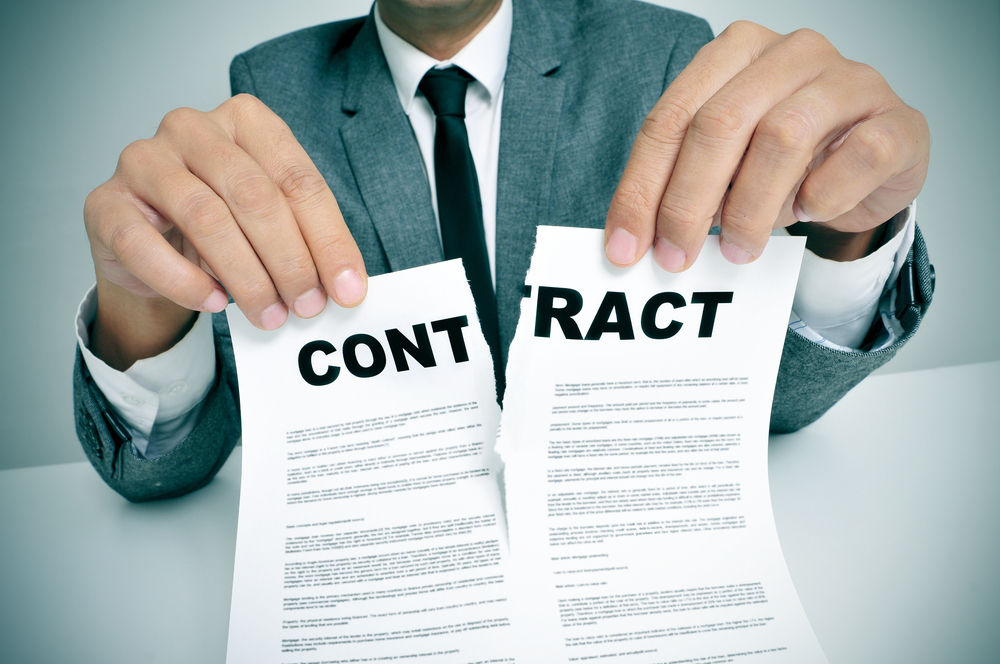
Yes, you can! However, there are only a few circumstances under which you can cancel your contract, including (but not limited to):
- You will be leaving the country.
- You no longer have any equipment that can receive NHK broadcast signals.
- You will be moving in with someone, so only one of you needs to pay for NHK.
If your situation does fit into one of these scenarios, congratulations! Here’s how to cancel your NHK contract.
- Call NHK and tell them that due to your situation, you need to cancel your NHK contract.
- NHK will send you cancellation papers by mail.
- Fill out your information and mail the papers back to them.
- If no issues with your paperwork arise, congratulations, your NHK contract has been cancelled!
NHK Customer Service: 0120-151515 (Hours: Weekdays 9:00 am – 8:00 pm)
Note that for step three, you may be asked to submit proof of your situation. For example, if you’ll be moving overseas, proof of this may be a copy of your flight ticket. If you threw away your TV, since it normally counts as extra-large garbage, a copy of your receipt to have it disposed of the proper way should suffice. That said, every person’s situation is different, so we highly suggest contacting the NHK for more personalized information.
Also, calling NHK can certainly be a bit of a hassle, so if your Japanese isn’t up to snuff, we recommend getting somebody more fluent in Japanese to handle it. Good luck!
How Do I Lower My NHK Payments?
So, let’s say you’re already signed up to the NHK or you don’t mind signing a contract with them, but you’d still like to save where possible. There are actually many ways to reduce your monthly fee, but few people know of them because NHK doesn’t make them very public. That’s where this article steps in!
◼️ Check Your Payment Plan
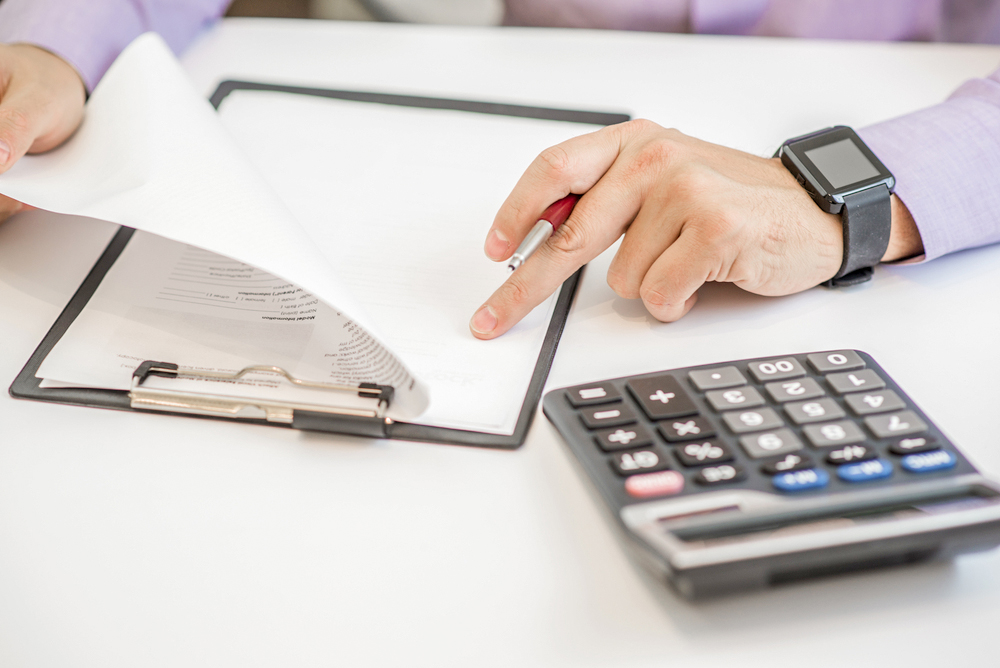
As you can see in the fee chart we put up earlier in the article, you actually save a couple of bucks every month if you choose to pay annually versus every month. You save even more money if you pay by credit card or bank transfer rather than payment slips, which are automatically sent to your home if you opt into them and can be paid at convenience stores, post offices, and banks.
◼️ Family Discount Plan

If a member of your family lives separately from you but relies on you financially, they can get 50% off their NHK plan. Examples of this include moving away for studies or accepting a temporary work transfer to another part of Japan. Alternatively, if you have multiple homes, except for your primary residence, all of them are eligible for 50% off the monthly NHK fee.
◼️ Student Discount Plan

If you need to live away from home due to studies and are under a scholarship or a tuition waiver/deferment plan because of financial difficulties, you can apply to be exempted from paying any NHK fees. This also applies if your family is exempt from paying residence taxes because of financial hardship or is receiving public assistance due to the same issue.
List of secondary and tertiary institutions with eligible scholarship programs: https://pid.nhk.or.jp/jushinryo/pdf/gakuseimenjyo_seido.pdf (Japanese Only)
List of tertiary institutions with eligible tuition waiver/deferment programs: https://pid.nhk.or.jp/jushinryo/pdf/jyugyoryomenjyo_seido.pdf (Japanese Only)
The application method differs depending on which category you fall under, so we recommend checking out the official NHK website for more information: https://pid.nhk.or.jp/jushinryo/StudentBranch.do (Japanese Only)
◼️ Natural Disaster Exemption Plan

If you and/or your residence(s) were caught in a large natural disaster, you can apply to be exempt from paying NHK fees. The application requirements, process, and exemption duration differ between events, so we strongly recommend checking the official NHK website for more information: https://pid.nhk.or.jp/jushinryo/menjo_info.html (Japanese Only)
◼️ Other Discounts/Exemptions
Apart from the above options, there are a couple of other ways that you can receive a discount or even be completely exempt from paying NHK fees. Below we list the ones that might be most relevant to our readers, but you can find a full list in Japanese through the official NHK website.

Every year, dozens of new expats to Japan run into a problem with the NHK. With this article, we hope to prevent many more from getting into the same sort of trouble. Whether you’re new to Japan or have lived here for a while, hopefully you’ll find this guide to the NHK useful!
*Title image credit: beeboys / Shutterstock.com
If you want to give feedback on any of our articles, you have an idea that you’d really like to see come to life, or you just have a question on Japan, hit us up on our Facebook!
The information in this article is accurate at the time of publication.
